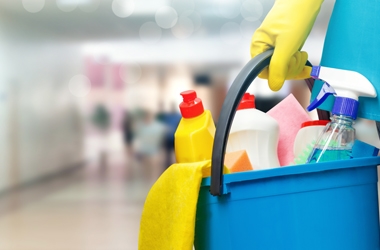The difference between biological and non-biological cleaning products
In the present market there are more cleaning products than its possible to list. Especially when new products are constantly emerging - new names appearing under well known brands and new, re-formulated mixes adding to an increasingly saturated market place.
But when it comes to purchasing what is the difference between cleaning products? what is it that influences our purchase? Is it familiarity? A brand with a rich history? The claims the product makes? Or, perhaps, these buying decisions are based on something else, maybe a mercenary approach to shopping or simply, what’s available at the time. In any of these choices, apart from perhaps, ethical decisions, are the ingredients of a product ever scrutinised? Sure, we see the big brand name, the colours, the use of clean images and the many product claims but how often does one look first at the TYPE of product they are buying?
By type, I mean, what makes the product in your hand the product it is and is it fit for purpose? Although we are often blinded by brand image and tend to rely primarily on the ‘directions of use’ the ingredients are really what sets a product apart and, for the purpose of this article, we will set these into three very separate types of cleaning product; Biological/bacteria based, Enzyme based and chemical based.
Biological cleaning products:
Biological, or bacteria based cleaning solutions work on a principle similar to probiotic drinks in the way they work. Probiotic drinks are known for ‘topping-up’, or ‘re-populating’ the gut with good bacteria. This act re-balances and essentially outnumbers the bad bacteria to help prevent that inner sluggish feeling and other general symptoms of illness.
In terms of the cleaning product, a biological solution will contain one or many strains of safe, naturally occurring microorganisms, which are blended with biodegradable surfactants. It is this bacteria that does the serious cleaning, the other ingredients assist but the bacteria is the real workhorse in this operation. The millions of microscopic living cells have the ability to consume and degrade a huge variety of waste and odour. These microscopic ‘cleaners’ will multiply and continue to work, removing traces of grime and odour across any surface long after initial application. In many cases, once they have consumed all there is, they lay dormant until a new food source is introduced (such as day to day grime, tracked in dirt and dropped food and drink). This cleaning cycle is really cost-effective when you think about it as these tiny organisms are constantly cleaning meaning you don’t have to clean as frequently or use as much product.
Using a biological cleaning product is also a great way to reduce environmental impact as well as help keep the user safe from adverse reactions associated with using standard cleaning chemicals. Biological cleaning is very much nature’s way of cleaning.
Enzyme cleaning products:
Although it is easy to get confused with the former, Enzymes are in fact not alive and are instead produced by bacteria (but can also be synthetic, created to replicate the activity of a natural enzyme).
An enzyme is basically a protein whose duty is to act as a catalyst to speed up chemical reactions quickly and efficiently. They are most commonly found in laundry and dishwashing tablets.
It is important to note that each type of enzyme is different and therefore will only catalyse one type of reaction, referred to in the industry as the ‘lock and key’ mechanism. This means they are highly specific to the type of surface or material they can work on and are therefore only active when conditions are correct for them.
In terms of cleaning, enzymes convert complex waste into simple waste which is unlike bacteria/biological based products which not only break down the waste, they also consume waste and convert it into safe products like carbon dioxide and water.
In terms of cleaning life - enzymes have a limited half-life. They aren’t living, do not reproduce and cannot repair themselves so, in the end, biodegrade after a short period of time.
Chemical based cleaning products:
All products mentioned contain chemicals in the natural sense. For example, water is a chemical formula so I’d just like to point out that reference to ‘chemical based’ in this section is outlining man-made, synthetic chemicals which have been artificially prepared in a product.
Man-made chemical cleaning products are a little more difficult to class into one group. They can vary from neutral pH washing agents based on non-ionic surfactants through to products, which contain toxic solvents and harsh acids.
A chemical cleaner can break down a range of soils and assist in masking odours and the cleaning solution has to be fairly versatile and suitable for dealing with a variety of types of soils. However to do a good enough job, sometimes a product with harsh, environmentally unsafe ingredients needs to be used. On the flip-side a man-made chemical cleaner, which claims to be environmentally responsible, may not clean as effectively which is why, when looking for environmentally responsible cleaning solutions it is better to look for the biological based versions rather than the chemical versions.
Overall there is a huge difference between biological and non-biological cleaning products which are specifically crafted for pretty much any cleaning task and sometimes it is a case of trial and error to find one that works best. However, of all the versions of products covered, the one that stands out as being the most versatile, the most effective and the most environmentally responsible is the biological / bacteria based solution. Maybe its time to re-think the misconception that harsh chemicals are an indication of a good cleaning product?
If you like this blog, you might be interested in our other post 'What is biological cleaning ?'
For information on the range of biological and non-biological cleaning products we at Envirodri offer, visit out products page

